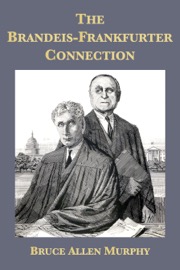 $9.99 on Kindle
$9.99 on Kindle(cover illustration by Elliott Banfield)
The Brandeis-Frankfurter Connection: The Secret Political Activities of Two Supreme Court Justices by Bruce Allen Murphy (199,000 words)
Originally published in 1982 by Oxford University Press and featured in a front-page story in the Sunday New York Times, this book describes the relationship between Justice Louis D. Brandeis and then-Harvard law professor Felix Frankfurter. While on the Court, Brandeis provided Frankfurter with funds to promote a variety of political reforms. The book sparked a debate about the ethics of extrajudicial activities by Supreme Court justices.
“This book sets out an historical narrative of hitherto unknown, undiscovered, yet rather extensive political activities by two major, highly respected justices of the United States Supreme Court... It now appears that in one of the most unique relationships in the Court’s history, Brandeis enlisted Frankfurter, then a professor at Harvard Law School, as his paid political lobbyist and lieutenant. Working together over a period of twenty-five years, they placed a network of disciples in positions of influence, and labored diligently for the enactment of their desired programs. This adroit use of the politically skillful Frankfurter as an intermediary enabled Brandeis to keep his considerable political endeavors hidden from the public. Not surprisingly, after his own appointment to the Court, Frankfurter resorted to some of the same methods to advance governmental goals consonant with his own political philosophy. As a result, history virtually repeated itself, with the student placing his own network of disciples in various agencies and working through this network for the realization of his own goals.” — Bruce Allen Murphy, in the Introduction to The Brandeis-Frankfurter Connection
“This study of the extrajudicial activities of two celebrated Justices of the Supreme Court makes a valuable and fascinating, if somewhat schizophrenic, book... Murphy has done a first-class job of research, supplementing his labors in the Brandeis and Frankfurter papers by extensive investigation in other manuscript collections and the Columbia University oral histories and by fruitful interviews with survivors... The Brandeis-Frankfurter Connection is a useful book. It is useful because it makes us think hard about standards of judicial behavior... And it is useful because it makes us think realistically about the Court itself.” — Arthur Schlesinger, Jr., The New York Times
“The Brandeis-Frankfurter Connection contains at once a great historical find and a thoughtful and, at times, brilliant essay on judicial propriety. This book deals superbly with questions not only of a citizen’s legitimate expectations for Supreme Court behavior but also of the broader role and hope for the performance of government... [Murphy] is a very reluctant muckraker who, after laying out the details, tries in a four-page conclusion to take much of it back, insisting that both the late justices ‘will survive as giants of twentieth-century America.’” — Bob Woodward, The Washington Post
“[F]ascinating reading... a serious and commendable work of scholarship, a partial but engaging and persuasive portrait of the Washington political community for a good slice of the 20th century.” — Nelson W. Polsby, Commentary Magazine
“A valuable study... the views of [Brandeis and Frankfurter] and their efforts to win acceptance for them have never been so searchingly studied and evaluated.” — Frank Freidel, The American Historical Review
“Murphy has authored a solidly researched and important book... Murphy amply demonstrates both his thorough research abilities and his talent for weaving material together to produce a work that flows like a well-written mystery... [and] deserve[s] much credit... for assembling hitherto known and unknown facts and placing them in a useful perspective... an important work.” — Alan Betten, University of Baltimore Law Review
“Murphy’s book persuasively demonstrates that Brandeis and Frankfurter never ceased to be the kind of men they were before they went to the bench-political men. Not that their behavior was unique or unprecedented. Murphy reminds readers that two-thirds of those who have sat on the highest court have engaged in ‘off-the-bench political activity’... Perhaps this book continues to stir emotions precisely because it establishes so convincingly the political effectiveness of two remarkable judges-men who have too long been esteemed as models of a pristine judicial probity that in our nation probably cannot exist.” — Victoria Schuck, The Wilson Quarterly



